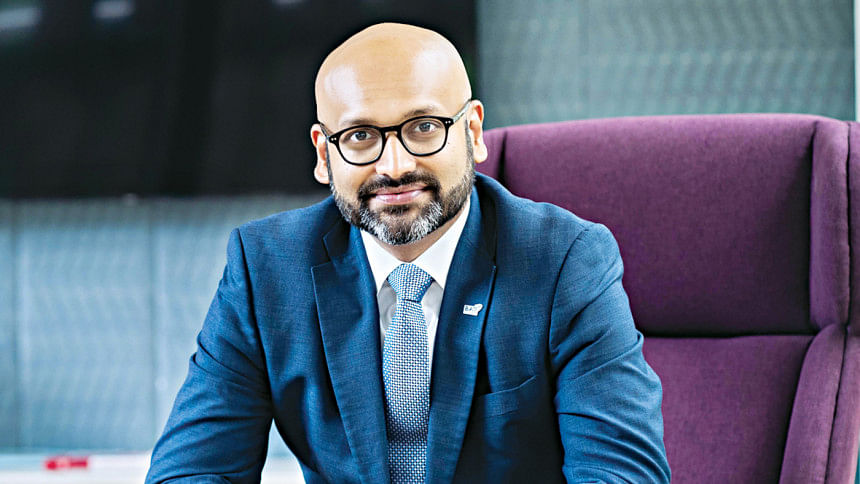Crafting the future: In conversation with Sheikh Shabab Ahmed of BAT Bangladesh

Our world is getting increasingly competitive by the day. To excel in this ever-shifting competitive world, the next generation of young leaders need to be on top of their game. We talk to Sheikh Shabab Ahmed, Head of External Affairs of BAT Bangladesh about how to build a future-fit next-generation and how his own experiences shaped him to be a successful leader.
Can you share the childhood experiences that shaped you up as a leader and individual?
In this modern age, transformation is happening at a lightning rate and we need to gear up to welcome this change to ensure the upcoming generation is future-fit. There are two ways to achieve that, firstly we must ensure a good education system and secondly, we have to provide effective interventions that will inspire and transform young aspirants into thoughtful leaders.
If I reflect on my life experiences and divide my life into two halves, my first 20 years were spent building myself as an individual through a structured educational process and in the second half, I gradually built my career path step by step.
At school, I was very fortunate to be a part of a curriculum where extracurricular activities were given equal priority as textbook education. I have been a part of clubs that involved sports, debate, science and more, all of which boosted my critical thinking capabilities along with developing my problem-solving skills and tried me in leadership role in a small scale. This balance is a vital part of growing up and should be one of the key focus areas for youth development.
Leadership skills need to be embedded in schools; we need to start from the basics and make sure that extracurricular activities become an essential part of our education system. To my view, 'extracurricular' should be termed as 'co-curricular activities'. We need to create opportunities and be a part of the solution, so the next generation leaders can thrive from within.
What are the key qualities one need to develop to be a successful leader?
Nurturing your passion and practicing discipline are the key aspects to becoming a successful leader in my opinion. While you are in that path, consistency should be the focal point.
From an early age, I have been passionate about cricket and other co-curricular activities which have taught me to face various practical situations in life, develop my leadership skills and it has also implanted the "go-getter" trait in me.
Over the years I have realised that when you do what you love, everything else falls into place in life. I always aim high and thus always reach somewhere that is far above from the average. One of my favourite quotes is 'if you shoot for the moon, you will reach among the stars'. I believe I am a successful and a content individual today, closer to my goals because I always built on my passions and did not let them slide, while also chasing stretching dreams.
As I am a parent now, I would like to request all the parents to support their children if they are into sports, performing arts, or any other co-curricular activities they are passionate about. They are the future of our country and we must encourage them to follow their passions and dreams along with structured education so that they build their confidence and create growth in society.
You have just completed your 16th year in this industry. What were the key factors and experiences that helped to map out your career path?
My journey at BAT Bangladesh began in 2006 as a territory officer in marketing department and as I completed my 16th year, I now stand as the Head of External Affairs, looking after Government related affairs and corporate affairs along with ensuring sustainability of the business. It has truly been an honour to have worked for such a prestigious organisation that has been the grooming ground for industry leading talents for over 111 years now. If I must reflect back, three factors helped me to map out my road to success.
Choosing the right organisation matters
The transition from a university student to the corporate world is a tricky one and often young people get attracted to the salary being offered rather than the bigger picture. It is important to understand your choices and go for the organisation that will add value to your career path and will also help you to start with a stronger foothold.
Your mentor is your biggest support system
Choosing the right people for growth is equally important. When you join a high-performing organisation, you might not have the liberty to choose your boss, but you can always choose your mentor.
Mentors guide you through situations and develop your soft skills. They say a good boss is essential for a good career; I would say a good mentor is much more important in this journey because they will be your support system, sounding board for your thoughts and would bring out your best version in all situations without prejudice.
Understanding the bigger picture
Constant learning and upskilling are essential if you want to be successful in the fast-evolving corporate world. The job you are doing today might be gone or evolved tomorrow so it's important to stay grounded and be adaptable. A good skillset, unparalleled experiences and a humble attitude will take you places in your career.
Over the past 16 years, I have pushed my limits and served various managerial roles within marketing and eventually secured my place in the ever-challenging External Affairs function. I took a leap of faith because I could relate to my personal goals in this current function. I believe, I was true to my dreams and thus made the choices which created avenues for me to grow not only within, but also beyond the organisation.
This decision also gave me the opportunity to serve on a global platform when I was appointed as the Global Regulatory Engagement Manager at BAT's Global Headquarters in London, UK. That was the game-changer for me, it gave me the confidence boost that was required at that point of time in my career to stretch my capabilities in a foreign environment and testing myself at the world stage.
You have been part of a demanding industry; how do you manage your work-life balance?
Now, in the post-Covid world, work has extended beyond work hours due to the virtual way of work. My wife, along with two sons and my parents are my true inspirations and driving forces. It is truly a demanding industry and it is always difficult to strike a balance, but if you have your family's support, then nothing can stop you from reaching the peak.
It's the small things that create life and no matter how intense my work can get at the end of the day, when I go back home and see my family smiling and waiting for me, it makes my day complete and worth it.
As one of the youngest corporate leaders, how would you like to contribute and ensure future-fit young leaders?
We need to capitalise on our youth population and prepare them for a transformational journey that's sweeping through Bangladesh. Considering the population dividend, we have, we need to drive them in the right path now.
Our current generation leaders are all leading most multi-national corporations now. We see more Bangladeshi CEOs than ever before. It is time we make this a norm, prepare and inspire the next generation trailblazers to carry the torch forward.
Our youth needs to be inquisitive about their future and build on their skill sets so that when their time arrives, they are ready to take on the responsibility.
For example, startups are exciting. But these days, there is a tendency among the younger generation to jump to start-up businesses right after graduation, without any structured work experience.
In my opinion, right after graduation, you lack the experience to run an organisation that can only be gained by working in the structured system where you are mentored by others and supported by proven structured system.
On-the-job learning will shape up your business sense and will support you to make informed decisions. So, in my opinion, it's important to get a job, get some first-hand experiences and then go for startups. Only this can lead to a sustainable business model.
I have completed 16 years of my journey and I have another 20 years till my retirement, if all goes well. In this tenure, I want to contribute by creating mentorship programs and advocate for agile working culture that will inspire and motivate young minds to express their thoughts and ideas. I will invest my personal time to design and implement purpose-driven leadership programs applicable for Bangladeshi environment that will prepare them to own up to challenging roles and drive innovation and take this country towards the dream of becoming a developed country by 2041.
"The time is always right to do what is right," said Martin Luther King Jr. Keeping that analogy in mind, I believe the time is right to create the future for Bangladesh now.

 For all latest news, follow The Daily Star's Google News channel.
For all latest news, follow The Daily Star's Google News channel. 



Comments